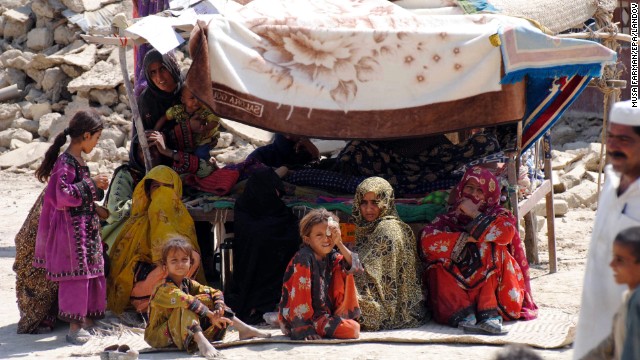The 7.7-magnitude quake
struck Tuesday in a remote, sparsely populated area of southwestern
Pakistan, but it had severe consequences.
At least 330 people have
lost their lives, a spokesman for the National Disaster Management
Authority said Wednesday. In addition to the fatalities, 445 people were
injured, he said.
And more people are still feared to be trapped in wreckage. Images from the scene showed some buildings reduced to rubble.
"Still, there are some areas that are not accessible," a spokesman for the Red Crescent told CNN.
"So that toll can be
increased," Khalid Bin Majeed said about the number of deaths. "When we
reach all the areas, then there will be a clear picture."
Rescue efforts are under
way in the heavily hit districts of Awaran and Kech in Balochistan
province. But severely damaged communications networks are hindering the
operation, said Jan Muhammad Buledi, a spokesman for the provincial
government.
Hundreds killed in Pakistan earthquake
Thousands of survivors
from the earthquake are facing difficulties in the two districts, he
added, saying that authorities have received offers of support from Iran
and Turkey.
The Pakistani military
has deployed more than 1,000 troops to the affected area to help with
rescue and relief efforts, some of them traveling in helicopters and
others in convoy on mountain roads.
About 10,000 food packs have been sent to the region. Each pack can feed a family for 15 days.
The troops are entering a
difficult region. Militants fighting for a separate state in
Balochistan operate out of part of Awaran district, which has been the
site of bombings in the past.
The remoteness of the
area means that some of the injured are having to be airlifted to major
cities such as Quetta, the capital of Balochistan, and Karachi, the
capital of neighboring Sindh province.
Island emerges
The quake was strong
enough to cause a mass 20 to 30 feet high to emerge from the Arabian Sea
like a small mountain island off the coast of Gwadar, local police
official Mozzam Jah said. A large number of people gathered to view the
newly formed island, he said.
Large quakes can cause significant deformation to the earth's crust, particularly visible along coastlines.
The island is about 100 feet in diameter and about one mile off the coast, GEO TV reported.
Zahid Rafi, principal
seismologist for the National Seismic Monitoring Center, confirmed the
island had formed. He said it was "not surprising," considering the
magnitude of the earthquake.
But John Bellini, a
geophysicist with the U.S. Geological Survey, said that generally it
would be unlikely for a large island to emerge from such a quake as
Tuesday's.
Many things, such as the tide, could come into play regarding the rise of the island, he said.
With a depth of about
nine miles (about 15 kilometers), the quake struck 43 miles (69
kilometers) northeast of Awaran and 71 miles (114 kilometers) northwest
of Bela, the U.S. Geological Survey said.
The tremors lasted two minutes. People flocked out onto the streets of Quetta.
Aftershocks could be felt in Karachi, hundreds of miles to the southeast.

No comments:
Post a Comment